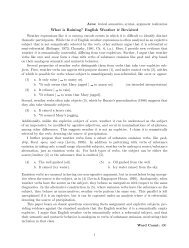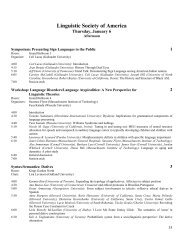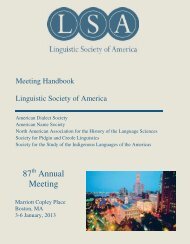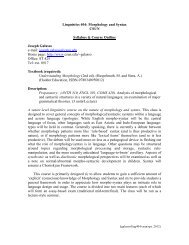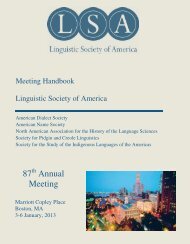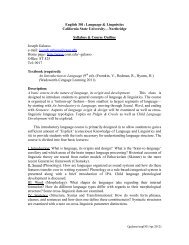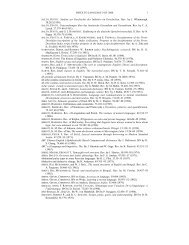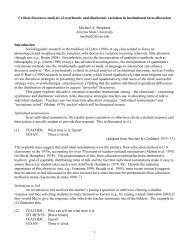esult from <strong>the</strong> informal methodology <strong>of</strong> data collection, i.e., relying on one's own judgments ra<strong>the</strong>r than collecting data within <strong>the</strong>principles <strong>of</strong> fieldwork. Fur<strong>the</strong>rmore, adequate controls are necessary to eliminate potential bias in <strong>the</strong> author's own grammaticalityjudgments. I propose that systematic data collection on all varieties ra<strong>the</strong>r than one's own dialect would resolve <strong>the</strong> currentmethodological problems in Turkish linguistics.Molly Babel (University <strong>of</strong> California, Berkeley) Session 101Michael J. Houser (University <strong>of</strong> California, Berkeley)Maziar Toosarvandani (University <strong>of</strong> California, Berkeley)Andrew Garrett (University <strong>of</strong> California, Berkeley)Descent vs diffusion in language diversification: Mono Lake Paiute & Western Numic dialectologyWe assess arboreal models <strong>of</strong> language relationship based on data from Mono Lake Paiute (MLP), a previously undocumented dialect<strong>of</strong> Nor<strong>the</strong>rn Paiute (NP). Mono and NP are <strong>the</strong> two members <strong>of</strong> <strong>the</strong> Western Numic branch <strong>of</strong> Uto-Aztecan; MLP is geographicallyintermediate. We show that some MLP innovations are shared with Mono dialects but not o<strong>the</strong>r NP dialects, while some apparent NPinnovations are absent in MLP. Western Numic behaves more like a dialect continuum than has been assumed, that is, and is lesscongenial to tree models <strong>of</strong> language diversification.Emmon Bach (SOAS/University <strong>of</strong> Massachusetts, Amherst) Session 105Fiona Campbell (University <strong>of</strong> British Columbia)Patricia A. Shaw (University <strong>of</strong> British Columbia)On a Nor<strong>the</strong>rn Wakashan suffix: -[x]'idThe suffix listed in Boas (1947:365-6) as -[x]'id has a number <strong>of</strong> interesting properties--semantic, distributional, comparative, andmorphophonological. We concentrate on <strong>the</strong> semantic and <strong>the</strong> morphophonological questions, taking Haisla/Henaaksiala as our mainempirical base—<strong>the</strong> disparate meanings raise questions about morphemic identity and <strong>the</strong> compositional character <strong>of</strong> complex lexicalitems, and <strong>the</strong> morphophonology leads to important questions about allomorphy and allophony. Our discussion touches on languageparticularand universal issues in <strong>the</strong> two domains.William Badecker (Johns Hopkins University) Session 1Gender & resolution agreementGender resolution patterns from a variety <strong>of</strong> languages (Italian, Icelandic, Modern Greek, Slovene, Serbian / Croatian, Latin, ando<strong>the</strong>rs) are shown to follow from <strong>the</strong> interaction <strong>of</strong> ranked, violable markedness constraints (e.g. *Fem >> *Masc >> *Neut) andfaithfulness constraints (e.g. a constraint requiring <strong>the</strong> phrase and all its conjuncts agree in gender, and ano<strong>the</strong>r that requires <strong>the</strong>conjoined phrase to agree on both gender and number with one <strong>of</strong> its conjuncts). The OT analysis is preferable to rule based proposals(too powerful) and to generalized feature based accounts using union or intersection <strong>of</strong> feature sets for gender (descriptivelyinadequate).Gabriela Pérez Báez (University at Buffalo, State University <strong>of</strong> New York) Session 10Jürgen Bohnemeyer (University at Buffalo, State University <strong>of</strong> New York)Domain mapping in spatial description: The case <strong>of</strong> Juchitán ZapotecMesoamerican languages are well-known for <strong>the</strong>ir highly productive systems <strong>of</strong> semantic extension <strong>of</strong> body part (BP) terms to objectparts and spatial regions. We compare <strong>the</strong> system <strong>of</strong> relational spatial nominals <strong>of</strong> Juchitán Zapotec to those described by MacLaury1989 for Ayoquesco Zapotec and by Levinson 1994 for Tzeltal Maya. On <strong>the</strong> basis <strong>of</strong> <strong>the</strong> Juchitán evidence, we suggest that a global‘structure mapping’ (Gentner 1983) as described by MacLaury and a shape/function-based algorithm as described by Levinson may bejust different parts <strong>of</strong> a larger cognitive domain mapping process.Adam Baker (University <strong>of</strong> Arizona) Session 3Quantitative models <strong>of</strong> internal & social factors in sound changeI present a quantitative computational model to test hypo<strong>the</strong>ses about <strong>the</strong> interaction <strong>of</strong> internal and external factors in sound change.Simulated speakers interact with one ano<strong>the</strong>r and modify <strong>the</strong>ir pronunciations based on social parameters; coarticulatory biases arealso optionally present in individual speakers. Results <strong>of</strong> simulations demonstrate that entire populations can participate in a soundchange that is phonetically-motivated for only a subset <strong>of</strong> speakers. This effect is robust even in sparsely connected social networks,indicating that sound changes can differentially affect subpopulations <strong>of</strong> a speech community only where one population activelyavoids <strong>the</strong> pronunciations <strong>of</strong> ano<strong>the</strong>r speech community.101
Adam Baker (University <strong>of</strong> Arizona) Session 3Quantitative models <strong>of</strong> internal & social factors in sound changeI present a quantitative computational model to test hypo<strong>the</strong>ses about <strong>the</strong> interaction <strong>of</strong> internal and external factors in sound change.Simulated speakers interact with one ano<strong>the</strong>r and modify <strong>the</strong>ir pronunciations based on social parameters; coarticulatory biases arealso optionally present in individual speakers. Results <strong>of</strong> simulations demonstrate that entire populations can participate in a soundchange that is phonetically-motivated for only a subset <strong>of</strong> speakers. This effect is robust even in sparsely connected social networks,indicating that sound changes can differentially affect subpopulations <strong>of</strong> a speech community only where one population activelyavoids <strong>the</strong> pronunciations <strong>of</strong> ano<strong>the</strong>r speech community.Brett Baker (University <strong>of</strong> New England, Australia) Session 37Mark Harvey (University <strong>of</strong> Newcastle, Australia)Complex predicates & argument structureWe argue that complex predicates fall into two classes in terms <strong>of</strong> argument structure. In coverb constructions, <strong>the</strong> contributingpredicates 'merge' to form single predicates at 'lexical conceptual structure' (LCS; Jackend<strong>of</strong>f 1990) that have <strong>the</strong> semantic range <strong>of</strong>monomorphemic verbs in English. In many serial verb constructions, by contrast, <strong>the</strong> contributing predicates do not merge. Thisallows for a much wider range <strong>of</strong> LCSs. However, none <strong>of</strong> <strong>the</strong> current analyses <strong>of</strong> complex predicates predict <strong>the</strong>se two classes. Weargue that <strong>the</strong>se differences fall out from <strong>the</strong> method <strong>of</strong> composition <strong>of</strong> <strong>the</strong> LCSs <strong>of</strong> each type.Wendy Baker (Brigham Young University) Session 27Laura Catharine Smith (Brigham Young University)The impact <strong>of</strong> cross-language perception on learning French & German vowelsThis study examines whe<strong>the</strong>r native English speakers judge English /i/ and /u/ as being more perceptually similar to ei<strong>the</strong>r German orFrench /i/, /u/, /y/ and whe<strong>the</strong>r differences in <strong>the</strong>se judgments cause differences in how accurately learners <strong>of</strong> German or Frenchperceive and produce vowels in <strong>the</strong>ir second language (L2). Results suggest that not only <strong>the</strong> language but also <strong>the</strong> L2 dialectadvanced learners were exposed to affect both <strong>the</strong>ir similarity judgments between English and German/French vowels and <strong>the</strong>ir abilityto produce (but not perceive) <strong>the</strong> vowels <strong>of</strong> <strong>the</strong>ir L2. Acoustic analyses are also used to account for <strong>the</strong> findings.Douglas Ball (Stanford University) Session 33Aki <strong>the</strong> predicator: A unified analysis <strong>of</strong> Niuean instrumentalsIn reassessing <strong>the</strong> behavior <strong>of</strong> preposition/particle aki in <strong>the</strong> Polynesian language Niuean, I argue that aki is a predicator, a kind <strong>of</strong>deficient verb with verbal lexical semantics but without verbal syntax. The dyadic, eventive denotation <strong>of</strong> aki can explain both <strong>the</strong>exceptional absolutive case-marking, both when aki is a ‘preposition’ and a ‘particle’, as well as <strong>the</strong> <strong>the</strong>matic restrictions put on <strong>the</strong>external argument when aki is a particle. Finally, this account feeds a view <strong>of</strong> aki-object extraction where <strong>the</strong> object <strong>of</strong> aki extracts asan ordinary absolutive, eliminating <strong>the</strong> need for <strong>the</strong> second aki proposed by Massam (1998).Marlyse Baptista (University <strong>of</strong> Georgia) Session 90Bare nouns in Cape Verdean Creole, European & Brazilian Portuguese: A comparative analysisI demonstrate how <strong>the</strong> determiner systems <strong>of</strong> Cape Verdean Creole (CVC), European Portuguese (EP), and Brazilian Portuguese (BP)diverge and converge. The use <strong>of</strong> bare nouns in CVC is significantly more widespread than in EP and BP where bare nouns are usedfor abstract, mass, or mass-type nouns and where bare plurals (overt plural marking) convey a generic, or an indefinitenonspecific/nonreferential plural reading. BP departs from EP and behaves like CVC in that it uses bare nouns (no plural marking)with a generic or indefinite nonspecific/nonreferential plural interpretation and proper names are not modified by definite determiners.Michael Barrie (University <strong>of</strong> British Columbia) Session 29The CED & cyclic linearizationThis proposal <strong>of</strong>fers a novel account <strong>of</strong> lack <strong>of</strong> extraction from subjects with expanded empirical coverage. We propose thatextraction from a moved XP is possible only if <strong>the</strong> XP has not moved across a phase boundary. Following Fox and Pesetsky 2005, weassume that linearization takes place near spell-out. If an XP moves out <strong>of</strong> a phase, its internal constituents are linearized before thatphase is closed <strong>of</strong>f. Once it has been linearized, no fur<strong>the</strong>r operations may alter that linear order, effectively freezing <strong>the</strong> XP, givingrise to CED effects.102
- Page 1:
MEETING HANDBOOKLINGUISTIC SOCIETY
- Page 5 and 6:
Meeting RoomsSECOND FLOORFOURTH FLO
- Page 7:
• LSA: Business Meeting and Award
- Page 11 and 12:
LSAThursday, 4 JanuaryEveningWelcom
- Page 13 and 14:
Friday MorningLSAConstructions and
- Page 15 and 16:
LSAFriday, 5 JanuaryAfternoonInvite
- Page 17 and 18:
Friday AfternoonLSAModeling Acquisi
- Page 19 and 20:
LSARules for Motions and Resolution
- Page 24 and 25:
LSASaturday AfternoonSymposium: Par
- Page 26 and 27:
LSASaturday AfternoonSyntactic Face
- Page 28 and 29:
LSASunday MorningFirst Language Acq
- Page 30 and 31:
American Dialect SocietyThursday, 4
- Page 32 and 33:
ADSSaturday, 6 JanuaryMorningSessio
- Page 34 and 35: American Name SocietyThursday, 4 Ja
- Page 36 and 37: ANSFriday AfternoonForms of Address
- Page 38 and 39: ANSSaturday AfternoonHistorical Ono
- Page 40 and 41: Society for Pidgin and Creole Lingu
- Page 42 and 43: SPCLSaturday, 6 JanuaryMorningSpeci
- Page 44 and 45: Society for the Study of the Indige
- Page 46 and 47: SSILAFriday AfternoonPhonology and
- Page 48 and 49: SSILASunday, 7 JanuaryMorningSemant
- Page 50 and 51: Part 1: Thursday, 4 JanuaryPart 2:
- Page 52 and 53: Donca Steriade (Massachusetts Insti
- Page 54 and 55: Friday, 5 JanuaryPlenary AddressCal
- Page 56: Saturday, 6 JanuaryPresidential Add
- Page 59 and 60: Thursday, 4 JanuaryTutorialA Field
- Page 61 and 62: Thursday, 4 JanuarySymposiumContinu
- Page 63 and 64: Friday, 5 JanuarySymposiumApproache
- Page 65 and 66: Friday, 5 JanuaryDigital Poster Ses
- Page 67 and 68: Stephen R. Anderson (Yale Universit
- Page 69 and 70: David Bowie (University of Central
- Page 71 and 72: Sharon Peperkamp (CNRS/University o
- Page 73 and 74: Elena Guerzoni (University of South
- Page 75 and 76: Claire Bowern (Rice University)Morp
- Page 77 and 78: Lise Dobrin (University of Virginia
- Page 79 and 80: We discuss the analysis of the vowe
- Page 81 and 82: Brian Agbayani (California State Un
- Page 83: squiggly shapes). Disfluency made n
- Page 87 and 88: final particle; this structure enco
- Page 89 and 90: Travis G. Bradley (University of Ca
- Page 91 and 92: demonstrated that 2-year-olds map n
- Page 93 and 94: Nancy J. Caplow (University of Cali
- Page 95 and 96: Sarah Churng (University of Washing
- Page 97 and 98: Jennifer Culbertson (Johns Hopkins
- Page 99 and 100: Scott Drellishak (University of Was
- Page 101 and 102: Marc Ettlinger (University of Calif
- Page 103 and 104: Scherre 2001 argue that the phenome
- Page 105 and 106: Cynthia A. Fox (University at Alban
- Page 107 and 108: structures to the double object con
- Page 109 and 110: Steven Gross (East Tennessee State
- Page 111 and 112: Heidi Harley (University of Arizona
- Page 113 and 114: equivalents. I argue that their sim
- Page 115 and 116: predictable, and/or restricted in d
- Page 117 and 118: Keith Johnson (University of Arizon
- Page 119 and 120: Andrew Kehler (University of Califo
- Page 121 and 122: comparative rate of acquisition acr
- Page 123 and 124: Pei-Jung Kuo (University of Connect
- Page 125 and 126: EunHee Lee (University at Buffalo,
- Page 127 and 128: Brook Danielle Lillehaugen (Univers
- Page 129 and 130: Martha J. Macri (University of Cali
- Page 131 and 132: Spanish subjects with unaccusative
- Page 133 and 134: Brad Montgomery-Anderson (Universit
- Page 135 and 136:
multi-ethnic configuration, and pos
- Page 137 and 138:
Natalie Operstein (University of Ca
- Page 139 and 140:
Nick Pharris (University of Michiga
- Page 141 and 142:
Anastasia Riehl (Cornell University
- Page 143 and 144:
Françoise Rose (CNRS-IRD) Session
- Page 145 and 146:
precedence also constrains stative
- Page 147 and 148:
use experimental and corpus techniq
- Page 149 and 150:
eads easily for astrophysicists.).
- Page 151 and 152:
domains of use are mostly complemen
- Page 153 and 154:
show that both concatenative and no
- Page 155 and 156:
Don Walicek (University of Puerto R
- Page 157 and 158:
positions. However, certain matrix
- Page 159 and 160:
Suwon Yoon (University of Chicago)



